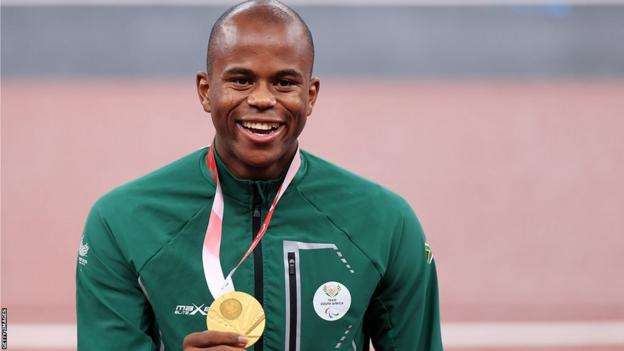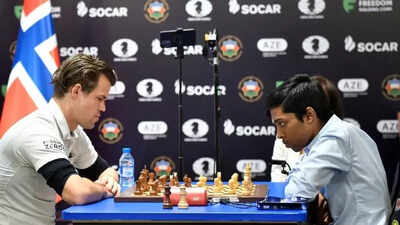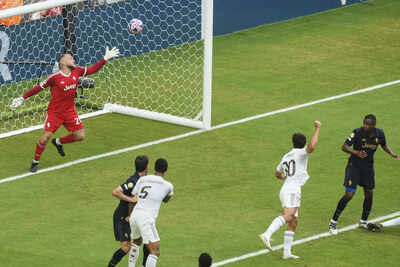South African Paralympic champion Ntando Mahlangu has had to be adaptable throughout his life.
After having both legs amputated at the knee when he was just 10, he has gone on to become one of his country’s most successful Para-athletes.
The 21-year-old became T61 200m world champion in 2019 before adding the Paralympic title in Tokyo in 2021 and also won gold in the long jump.
Now, as he bids to retain his long jump crown in Paris next year, he has switched training bases from his native country to Britain and Loughborough University – a move he hopes will pay dividends on and off the track.
“I want to get the best opportunities in both my academic life and in my athletics training and Loughborough is giving me that platform,” he tells BBC Sport.
“I always want to give back to the sport – that is very important to me. Sport has given me the opportunity to become the person I am, so I want to give back to the community, to athletics and to those who don’t have the opportunities I have had. That is important for me.”
Born with fibular hemimelia – a condition where his legs did not develop fully below the knees – Mahlangu used a wheelchair before his amputation in 2012. Later that year, he received his first set of blades and a sporting star emerged.
“I was a bit young, so I think after my amputation I didn’t realise that actually I had lost part of me, so it was quite an emotional hurdle that I had to overcome,” he explains.
“But when I got my prosthetics things became normal and I started gaining confidence and being motivated to go outside and do things like normal kids do.”
He parked his dream of becoming a footballer and focused on athletics, making his Paralympic debut at Rio 2016 as a raw, talented 14-year-old.
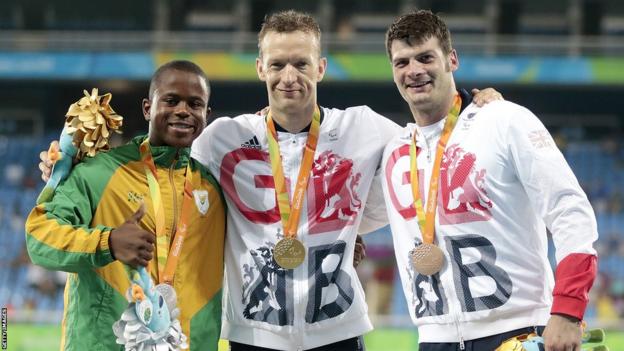
Mahlangu describes winning silver behind Britain’s Richard Whitehead in the T42 200m as “a big setback” and says that “he wanted more than I could give at that time” but it proved to be a key learning point for his career.
“Looking back now, if I could tell my 14-year-old self anything, it would be to be patient with yourself,” he says.
“Sometimes rushing the process is not the way to go. If you take everything slowly and correct the smallest details, you will get there.
“I’ve learned that everything will come when it is your time and when it is not your time, you go back to the drawing board, check what you have done wrong and then go and do it again. It all has to lead with patience.”
Patience is something the South African has had to have in abundance as matters outside his control have dictated the top-level events in which he is able to compete.
His T61 200m event – for athletes with lower limb impairments who use prosthesis – has struggled for numbers in recent times and only five athletes competed in it in Tokyo. The decline in numbers meant it was decided the event would not be viable for Paris.
It forced Mahlangu to rethink his options and he decided to focus his training efforts on the long jump, which will be in the Paris schedule.
“It was a decision I had to take because if I didn’t have the long jump, I wouldn’t have a Paralympic career,” he says.
“You have to be mentally prepared to take that decision and to do what the coach says and put that into play. Not every athlete has that.
“It isn’t easy to be a sprinter one day and the next day a jumper, but it shows the level of athlete I am prepared to be.
“I’m more of a sprinter and the long jump is quite a technical, tactical event but I take it as it comes and I’m grateful to have the athletic ability to change. I use what I have and I give it my best.
“I would be prepared to be a javelin thrower tomorrow if that is what the world gives me.”
He took to the runway in the T63 final in Tokyo where, competing against some rivals who are single-leg amputees, he soared to a new world record of 7.17m to win his first Paralympic gold medal.
Days later he completed the double, pushing long-time rival and mentor Whitehead into silver in the 200m final.
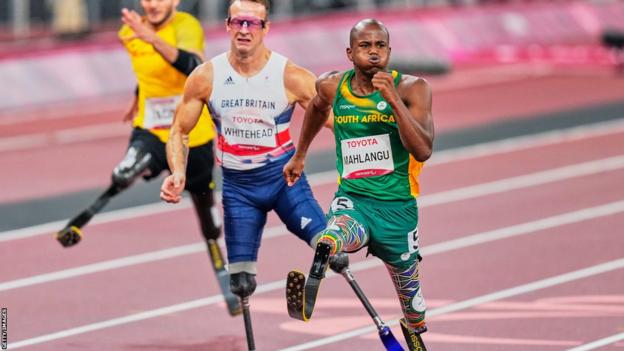
Mahlangu, who is studying business at Loughborough, is now training under coach Joe McDonnell in a group which also includes Paralympic 100m T38 champion Thomas Young and some non-disabled athletes.
Having swapped the balmy temperatures of South Africa for Loughborough in the winter, he “thinks he loves the cold” and is hoping that the new experiences will allow him to be better prepared for competition.
While he is playing down talk of winning another gold medal in Paris, Mahlangu is keen to make sure that Paralympic sport in South Africa, across the continent and throughout the world has a bright future.
“I compete for the people,” he says. “I have done a lot for myself. I’ve broken world records and won gold medals but it’s not about me, it’s about something bigger – putting a smile on people’s faces and also giving youngsters the chances and making sure we are passing on the baton to the next generation.
“If I could create opportunities and open more doors for every kid out there who doesn’t have them, I think then I would see myself as the best Paralympic athlete.
“There were doors I had to knock very hard on, but if I was to make it easier for the next generation that would be a highlight of my career.
“The guys are running faster, jumping higher but are they really getting what they are supposed to? It is about growing Paralympic sport and get it to where it should be.”



